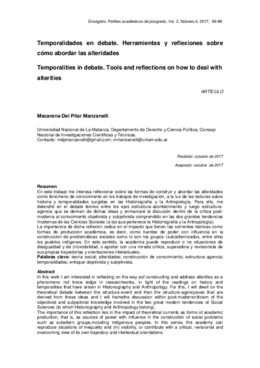Temporalidades en debate. Herramientas y reflexiones sobre cómo abordar las alteridades
Temporalities in debate. Tools and reflections on how to deal with alterities
Abstract
En este trabajo me interesa reflexionar sobre las formas de construir y abordar las alteridades como fenómeno de conocimiento en los trabajos de investigación, a la luz de las lecturas sobre historia y temporalidades surgidas en las Historiografía y la Antropología. Para ello, me detendré en el debate teórico entre los ejes estructura-acontecimiento y luego estructura-agencia que se derivan de dichas ideas y enmarcaré la discusión dentro de la crítica post-moderna al conocimiento objetivista y subjetivista comprendido en las dos grandes tendencias modernas de las Ciencias Sociales (a las que pertenece la Historiografía y la Antropología).
La importancia de dicha reflexión radica en el impacto que tienen las corrientes teóricas como formas de producción académica, es decir, como fuentes de poder con influencia en la construcción de problemáticas sociales como lo son los grupos (sub)alternizados, entre ellos los pueblos indígenas. En este sentido, la academia puede reproducir o no situaciones de desigualdad y de (in)visibilidad, o aportar con una mirada crítica, superadora y revisionista de sus propias trayectorias y orientaciones intelectuales. In this work I am interested in reflecting on the way sof constructing and address alterities as a phenomeno nof know ledge in researchworks, in light of the readings on history and temporalities that have arisen in Historiography and Anthropology. For this, I will dwell on the theoretical debate between the structure-event and then the structure-agencyaxes that are derived from these ideas and I will framethe discussion within post-moderncriticism of the objectivist and subjectivist knowledge involved in the two great modern tendencies of Social Sciences (to which Historiography and Anthropology belong).
The importance of this reflection lies in the impact of theoretical currents as forms of academic production, that is, as sources of power with influence in the construction of social problems such as subaltern groups,including indigenous peoples. In this sense, the academy can reproduce situations of inequality and (in) visibility, or contribute with a critical, revisionist and overcoming view of its own trajectory and intellectual orientations.

